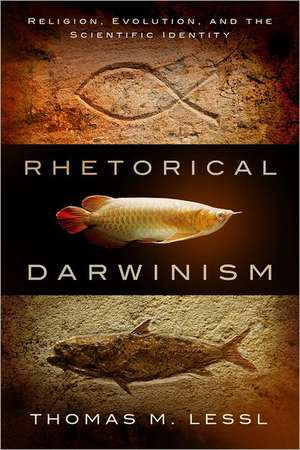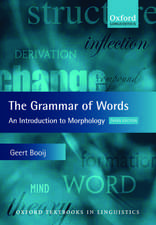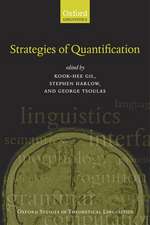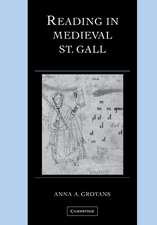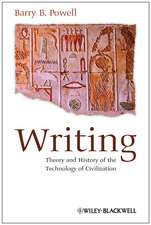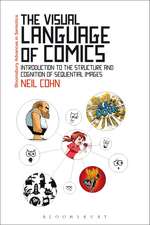Rhetorical Darwinism: Religion, Evolution, and the Scientific Identity: Studies in Rhetoric & Religion
Autor Thomas M. Lesslen Limba Engleză Hardback – 14 feb 2012
| Toate formatele și edițiile | Preț | Express |
|---|---|---|
| Paperback (1) | 359.00 lei 43-57 zile | |
| Baylor University Press – 14 feb 2012 | 359.00 lei 43-57 zile | |
| Hardback (1) | 362.80 lei 22-36 zile | |
| Baylor University Press – 14 feb 2012 | 362.80 lei 22-36 zile |
Preț: 362.80 lei
Nou
Puncte Express: 544
Preț estimativ în valută:
69.44€ • 71.56$ • 58.62£
69.44€ • 71.56$ • 58.62£
Carte disponibilă
Livrare economică 10-24 februarie
Preluare comenzi: 021 569.72.76
Specificații
ISBN-13: 9781602584037
ISBN-10: 1602584036
Pagini: 348
Ilustrații: Illustrations
Dimensiuni: 152 x 228 x 26 mm
Greutate: 0.6 kg
Editura: Baylor University Press
Colecția Baylor University Press (US)
Seria Studies in Rhetoric & Religion
ISBN-10: 1602584036
Pagini: 348
Ilustrații: Illustrations
Dimensiuni: 152 x 228 x 26 mm
Greutate: 0.6 kg
Editura: Baylor University Press
Colecția Baylor University Press (US)
Seria Studies in Rhetoric & Religion
Recenzii
"With his insights into rhetoric, culture, and the English Reformation, Thomas Lessl makes a plausible case that the reformist science rhetoric of Francis Bacon and Thomas Henry Huxley gave us much more than research institutions--it also paved the way for a public ethos of evolutionism, a vision of 'progress' that keeps science well-funded and prestigious. We may never see Bacon and Huxley--or the creation-evolution debate--the same again." --Larry Witham, author of Where Darwin Meets the Bible: Creationists and Evolutionists in America
"This is a superb piece of scholarship that ranges widely across disciplinary boundaries, shedding light on the underlying humanity of scientific inquiry and, ultimately, on its politics and sociology as well. Lessl asks novel questions about axiology and ontology and, in so doing, he becomes Charles Darwin's amaneusis for a new age." --Roderick P. Hart, Dean, Shivers/Cronkite Chair in Communication, University of Texas
"I love it! Rhetorical Darwinism is a great read and is a truly important contribution, not just to understanding the impact of Charles Darwin and his theory of evolution, but also to situating the public place of science. I recommend this book highly." --Michael Ruse, Director of the Program in History and Philosophy of Science, Florida State University
Science is no mere private pursuit. Rather, the most influential scientific ideas can transform a culture gradually, by first aligning themselves with older cultural ideas and icons, overthrowing the old order in the process. Those who wish to understand how 'evolutionism' insinuated itself into modern culture do no better than to read Lessl's work." --Michael J. Behe, Professor of Biological Science, Lehigh University
"Lessl challenges readers to link thinkers and texts in a connected series across centuries and to see how current secular values grew incrementally from religious beliefs." --Jeanne Fahnestock, author of Rhetorical Style: The Uses of Language in Persuasion
From the beginnings of the scientific revolution, demarcating the boundaries of science has been a problem for the scientific community. Thomas Lessl, comparing 'evolution' with what he calls 'rhetorical Darwinism,' argues persuasively that the scientific establishment has never guarded those borders carefully. -- Christianity Today
"This is a superb piece of scholarship that ranges widely across disciplinary boundaries, shedding light on the underlying humanity of scientific inquiry and, ultimately, on its politics and sociology as well. Lessl asks novel questions about axiology and ontology and, in so doing, he becomes Charles Darwin's amaneusis for a new age." --Roderick P. Hart, Dean, Shivers/Cronkite Chair in Communication, University of Texas
"I love it! Rhetorical Darwinism is a great read and is a truly important contribution, not just to understanding the impact of Charles Darwin and his theory of evolution, but also to situating the public place of science. I recommend this book highly." --Michael Ruse, Director of the Program in History and Philosophy of Science, Florida State University
Science is no mere private pursuit. Rather, the most influential scientific ideas can transform a culture gradually, by first aligning themselves with older cultural ideas and icons, overthrowing the old order in the process. Those who wish to understand how 'evolutionism' insinuated itself into modern culture do no better than to read Lessl's work." --Michael J. Behe, Professor of Biological Science, Lehigh University
"Lessl challenges readers to link thinkers and texts in a connected series across centuries and to see how current secular values grew incrementally from religious beliefs." --Jeanne Fahnestock, author of Rhetorical Style: The Uses of Language in Persuasion
From the beginnings of the scientific revolution, demarcating the boundaries of science has been a problem for the scientific community. Thomas Lessl, comparing 'evolution' with what he calls 'rhetorical Darwinism,' argues persuasively that the scientific establishment has never guarded those borders carefully. -- Christianity Today
Cuprins
1. The Social Meaning of Evolutionary Rhetoric 2. Francis Bacon and the Scientific Identity 3. Science in God's Bosom 4. From Two Books to One 5. The New Christianity 6. Positivism in the World of Thomas Huxley 7. Scientism Scientized 8. The Continuing Education of Evolutionism and Science's Battle for the Public Mind
